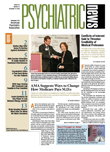Using the genome-wide scanning technique, Dutch scientists have identified associations between schizophrenia and several key genes with neurological functions that are disrupted by copy number variations (CNVs).
In an initial screening of 54 Dutch patients with the deficit subtype of schizophrenia, the authors homed in on four particular genes that are disrupted by rare CNVs: myt1l, ctnnd2, nrxn1, and astn2. Disruption of these four genes remained significantly associated in a larger sample of 752 additional patients with schizophrenia with various subtypes in the second part of the study.
CNVs are structural variations in chromosomes in which chunks of DNA are deleted or duplicated at random. CNVs may arise spontaneously in an individual or be passed from parent to offspring. Because they sometimes delete or disrupt important genes, these variations are attracting growing interest in genetic research as a cause for diseases or for vulnerability to diseases.
A number of different CNVs, including both deletions and duplications, were found to disrupt the same four genes. All the genes are known to be important to the normal function, adhesion, and migration of neurons in the brain, and all of these genes, except nrxn1, are new risk genes associated with schizophrenia that had not been identified in previous research. Other CNV-affected chromosomal regions have been associated with schizophrenia in recent research studies (Psychiatric News, May 2 and September 19).
Although each CNV was rare, the total frequency of disruptions was 7 percent in the study sample of deficit schizophrenia. The total frequency in the mixed-subtype schizophrenia sample of 752 patients was 0.9 percent. Among the healthy controls, none had a CNV that affected the coding sequence in these four genes.
Like the CNV-related disruptions in previous studies, the affected genes found here have also been linked to mental retardation and autism. “The genetic findings suggest an overlap in disease etiology, which implies that schizophrenia is a neurodevelopmental disorder [like autism and mental retardation],” Roel Ophoff, Ph.D., one of the study researchers, told Psychiatric News. He is an associate professor of medical genetics at Utrecht University in the Netherlands and an assistant professor of human genetics and psychiatry and behavioral sciences at the University of California at Los Angeles.
“However, it is possible that this is only part of the story,” Ophoff noted, because these CNV-disrupted genes still account for only a fraction of the patients. Obviously, “the spectrum of symptoms seen in patients with specific genomic aberrations is not different from [that in] patients without these rare CNVs.”
As more evidence of genetic associations are discovered for schizophrenia and other neuropsychiatric disorders, the real picture may be very complicated. “There might be non-neurodevelopmental pathways involved in schizophrenia as well,” said Ophoff.
The study was published in the October 10 American Journal of Human Genetics and funded by grants from the Netherlands Organization for Health Research and Development and the U.S. National Institute of Mental Health.
An abstract of “Recurrent CNVs Disrupt Three Candidate Genes in Schizophrenia Patients” is posted at<www.cell.com/AJHG/abstract/S0002-9297(08)00501-6>.▪
